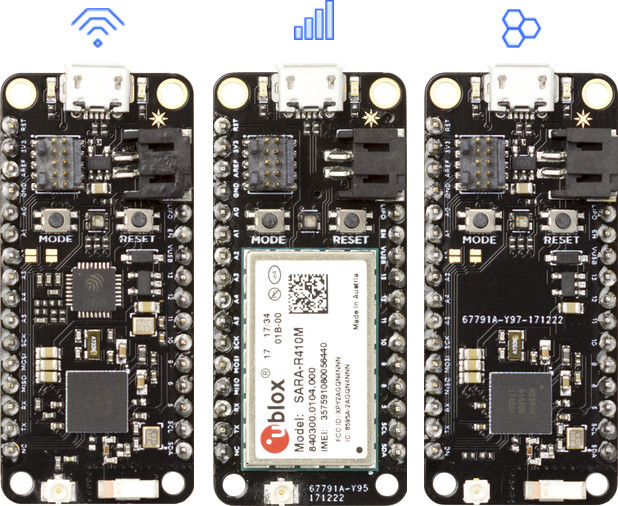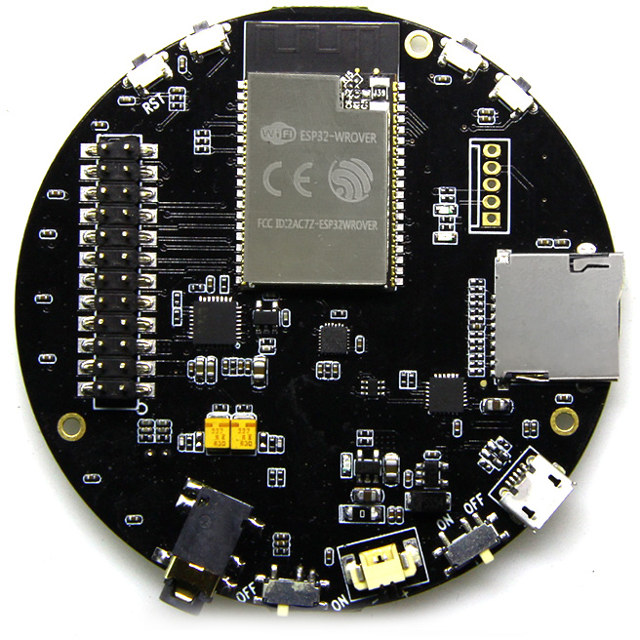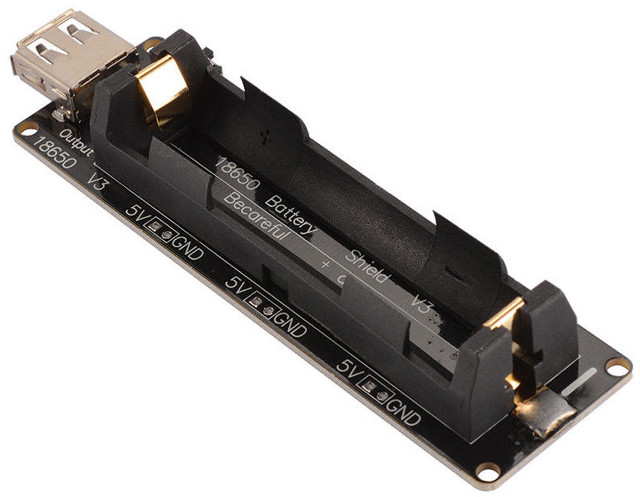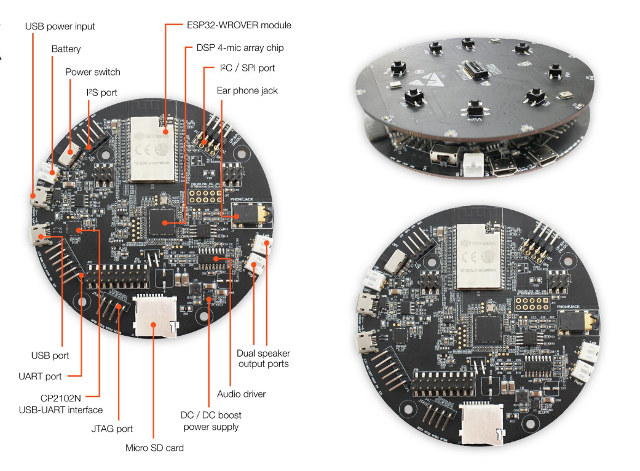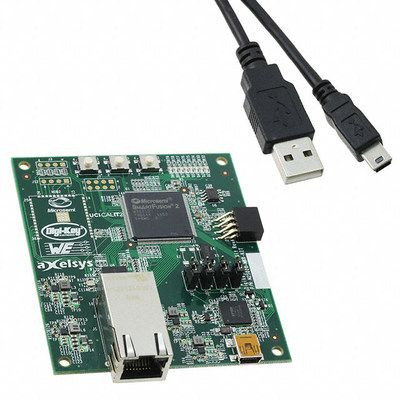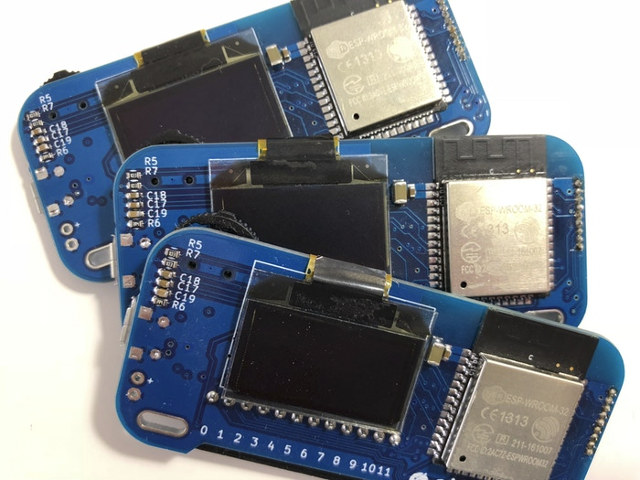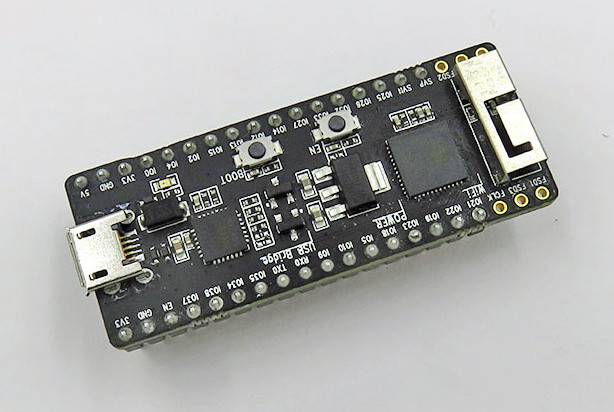In the last year or so, Bluetooth has gotten an upgrade with the release of Bluetooth 5. The new protocol works on several existing platforms, but if you want support for the full set of Bluetooth 5 features such as longer range and higher bandwidth, we’ve seen you need a recent chip such as Nordic Semi nRF52840. However so far, AFAIK you had to buy Nordic Semi own development kit for play with nRF52840, and now Particle has announced not one, but three low cost development boards powered by nRF52840 chip starting at just $9, and supporting their newly announced Particle Mesh technology. So for some reasons, it appears they did not go with Bluetooth Mesh. Particle Xenon – Bluetooth 5 + Mesh Xenon is the cheapest model with the following specifications: SoC – Nordic Semiconductor nRF52840 Arm Cortex-M4F 32-bit processor @ 64MHz with 1MB flash, 256KB RAM Storage – […]
TTGO TAudio V1.0 is a $20 Audio Board with ESP32-WROVER Module
Espressif Systems may have recently unveiled their Audio Mic HDK suitable for all sort of audio applications including smart speakers, but if you need an ESP32 board that’s available now and don’t need a microphone array, TTGO TAudio V1.0 board may be an option. The board – also known as TTGO T9 – features an ESP32-WROVER WiFI + Bluetooth module, a Wolfson audio codec with a 3.5mm audio jack and built-in microphone, as well as an RGB LED array and a motion tracking sensor. TTGO T9 / TAudio V1.0 board hardware specifications: Wireless Module – ESP32-WROVER 802.11 b/g/n + Bluetooth 4.1 LE module with 4MB Flash, 4MB PSRAM External Storage – micro SD card slot Audio Cirrus Logic / Wolfson WM8978 stereo audio codec 3.5mm audio jack Microphone Sensor – InvenSense MPU9250 9-Axis (Gyro + Accelerometer + Compass) MEMS device Expansion 24-pin header with GPIOs, I2C, UART, VP/VN, speaker out, […]
$2 USB “18650 Battery Shield” Powers Arduino, ESP32, and Other Low Power Boards with a 18650 Battery
If you’re looking for battery power for one of your projects, you may consider a “18650 battery shield” – going for just above $2 on Aliexpress or eBay – for powering Arduino boards, Espressif ESP8266 or ESP32 boards, or any board that can be powered by 5V up to 2A via USB or headers, or by 3V up to 1A via headers. Specifications listed on eBay/Aliexpress: Power Input – 5 to 8V via micro USB port up to 0.5A charging Power Output 5V via Type A USB port 3V up to 1A via 3x 2-pin header 5V up to 2A via 3x 2-pin headers Misc – 1 switch control USB output, LED for charging status (green = full, red = charging) Battery protection (Over-charge or Over-discharge) Dimensions – 9.8 x 2.9 cm You’ll need to add your own 18650 battery, and be careful about polarity while installing it, since putting […]
Espressif ESP32 LyraTD MSC HDK is Designed for Smart Speakers, Wireless Audio and other Smart Home Appliances
[Update February 17, 2018: The kit was previously referred as ESP32 LyRaTD MS1, but the company appears to have changed the name to ESP32-LyRaTD-MSC] So apparently voice command will represent 50% of all searches in the next two years, and everybody is jumping on the smart speaker bandwagon, with announcements from many companies at CES 2018, including Google’s Android Things + Assistant products‘ announcement, NXP i.MX 8M official launch, Amazon Alexa Voice Service (AVS) development kit from Amlogic and Allwinner, and more. Espressif Systems is about to join the party with their ESP32 LyraTD MS1 HDK (Hardware development kit) that most people will likely remember as “Audio Mic HDK” that was announced on Twitter. Espressif Audio Mic HDK specifications: Wireless Module – ESP32-WROVER module with 802.11 b/g/n WiFi and Bluetooth 4.1 LE connectivity. DSP – 4-mic array chip Storage – micro SD card for audio files Audio Audio driver chip […]
$34 SmartFusion2 Maker Board Arm Cortex-M3 + FPGA Board Supports ESP32 & ESP8266 Modules
Xilinx Zynq SoCs are probably the most well-known FPGAs with ARM cores, as their Cortex A9/A53 cores can run Linux, but they are not the only ones. Microsemi launched SmartFusion2 SoC comprised of FPGA fabric and an Arm Cortex-M3 core in 2013, as well as a $300 development kit. The company has now partnered with Digikey to launch SmartFusion2 Maker Board, a low-cost evaluation platform for the SoC that comes with Gigabit Ethernet, a USB port, a connector for ESP8266 module, PCB footprint for ESP32 module, among other features like a light sensor, LEDs, and buttons. SmartFusion2 maker board (M2S010-MKR-KIT) main features & specifications: SoC – Microsemi SmartFusion2 M2S010 SoC with: Arm Cortex-M3 @ 166 MHz, 6oKB+80KB eSRAM, 256KB eNVM FPGA with 12,084 logic element, 400 Kbits RAM Storage – 16 Mbit SPI Flash Connectivity Gigabit Ethernet via VSC8541 PHY, RJ45 connector Connector for ESP8266 (Sparkfun WRL-13678 – not included) […]
Year 2017 in Review, Top 10 Posts, and Some Fun Stats
2017 is coming to an end, and as I do every year, I’ll take a look back at the year that was on CNX Software. The pace of development boards launches has not slowed down this year, and we get an even wider range from the low-end with Orange Pi or NanoPi boards, to much more powerful ARM boards, and some new entrants like Libre Computer. The same is true for TV boxes, most of which now support 4K HDR, ranging from ultra cheap models selling for less than $20 to higher end Android TV boxes, while mini PCs were dominated by Intel Apollo Lake models, although some Cherry Trail products were also launched. Processor-wise, Amlogic launched more Amlogic S905X derivatives with S905W/S905D/S905Z, which are popular in the TV box market. Rockchip’s most interesting processor this year was RK3328 quad core Cortex A53 processor designed for 4K HDR Android TV […]
Obniz ESP32 Board is Programmable in JavaScript from the Cloud (Crowdfunding)
ESP32 WiFi / Bluetooth boards are now commonly supported by the Arduino IDE, and alternative firmwares are also available to program them using JavaScript (e.g. Espruino), or MicroPython. But if are familiar with JavaScript / Node.js, and don’t want to flash your own firmware, Obniz board could be an option. The board exposes 12 I/Os programmable from the company’s Cloud service, and features a OLED display used to show your program information, or a QR code to easily program the board from your smartphone’s browse once a WiFi connection has been setup. Obniz hardware specifications: Wireless Module – ESP-WROOM-ESP32 based on ESP32 dual core 802.11 b/n/g WiFi + Bluetooth LE WiSoC Display – 128×64 OLED display I/Os 12x I/O pins each configurable as GPIO, ADC, UART, SPI or I2C (no specialized pin, each can handle those functions) Up to 1A drive per I/O to control motors 3.3 or 5V selectable […]
ESP32-PICO-KIT v4 Board Based on ESP32-PICO-D4 SiP Now Available for $10
A little while ago, I received a bunch of ESP32 PICO Core development boards which were based on Espressif Systems ESP32-PICO-D4 system-in-package with ESP32, 4MB SPI Flash, and other components. The advantage of such chip is that is requires less external component, and allows for smaller designs. For example, the boards I received would leave two row of pin on each side of the board, while most other ESP32 boards will only expose one row on each side. I used the board to play with Micropython ESP32 port, and later-on when I launched a giveaway of 8 of the boards, I found out the name had changed to ESP32-PICO Kit, with the documentation listing v3 with all pins connected to male headers, and v4 with 6-pin not connected to a male header as shown in the photo below. Both versions of the board also have a different pin layout. But […]


